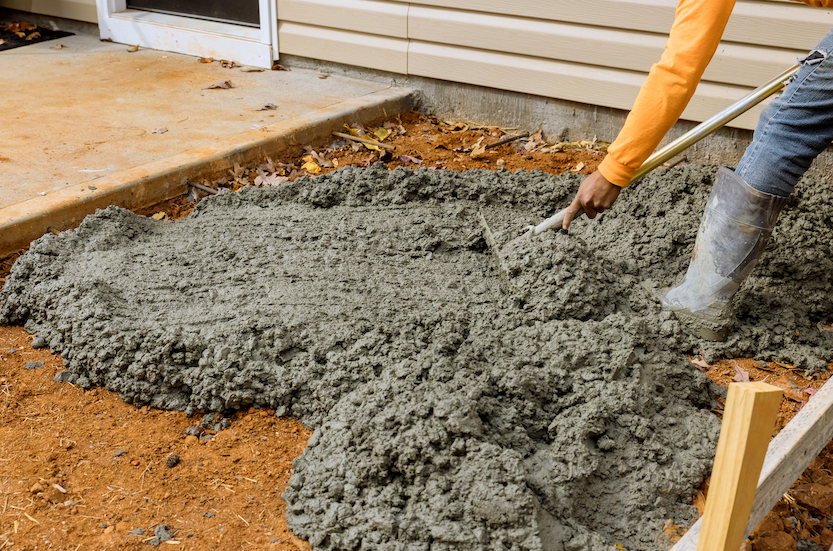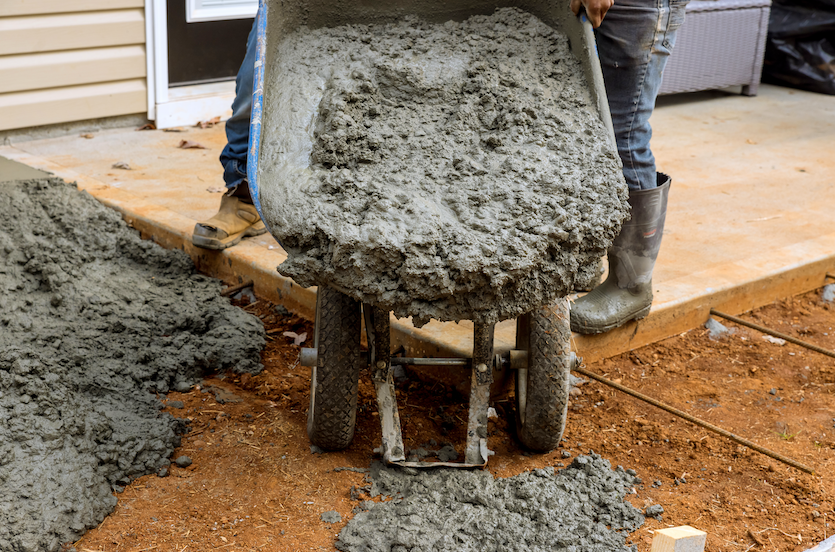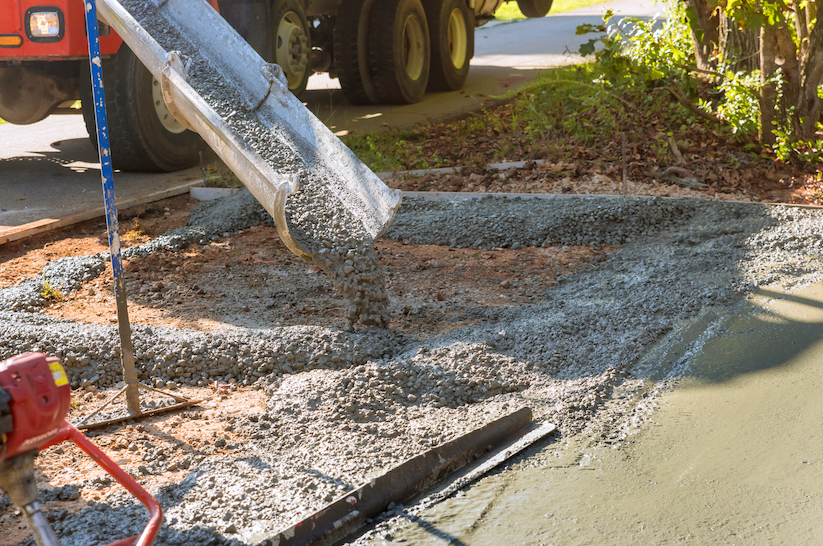Ah, the age-old concrete conundrum – do you mix it yourself on site or get it delivered ready to pour? It’s a bit like the “cook from scratch or order takeaway” debate, but with significantly more implications for your building project’s success!
If you’re umming and ahhing about which option to go for, grab a cuppa and let’s have a proper natter about the real differences between ready mix and site-mixed concrete. No technical jargon overload – just the straight-up facts you need to make the right choice for your project.
The Mixing Process: Chalk and Cheese
Let’s start with the obvious bit – how each type of concrete actually comes into being.
Site-mixed concrete involves you (or your increasingly grumpy labourer) manually measuring and mixing cement, sand, aggregate and water on your site. This might be done by hand for tiny jobs (hello, arm workout!), with a cement mixer for medium tasks, or with a volumetric mixer for larger pours.
Ready mix concrete, on the other hand, is mixed in a specialised batching plant before being delivered to your site in a truck with that iconic rotating drum we all drew as kids. It arrives perfectly mixed and ready to pour – hence the rather on-the-nose name!
Quality Control: Night and Day Difference
Here’s where things get interesting – and why most professionals have long since binned off the DIY approach.
With site-mixed concrete, quality depends entirely on whoever’s doing the mixing. Even with the best intentions, consistency between batches can be about as reliable as British summer weather. One batch might be spot on, while the next could be too wet, too dry, or have the wrong ratio of ingredients.
Ready mix concrete is mixed under laboratory conditions with computer-controlled precision. Each batch is consistent with exactly the right proportions of materials, and quality checks happen before it ever leaves the plant. The upshot? Concrete with predictable strength, setting time, and performance. No guesswork, no crossed fingers, just reliable results every time.
One of our customers recently told us about a garden wall he built years ago using site-mixed concrete. One section has weathered beautifully, while another began crumbling after just two winters. Classic example of batch inconsistency coming back to bite!
Time and Labour: A No-Brainer
Let’s be brutally honest about the faff factor here.
Site-mixed concrete is labour-intensive and time-consuming. There’s the setting up, the measuring, the mixing, the cleaning up afterwards – and that’s before you’ve even poured the stuff! For anything beyond the smallest jobs, you’re looking at significant time and manpower.
Ready mix concrete eliminates all of that palaver. Your team can crack on with other tasks until the concrete arrives, and once it does, it’s straight to the pouring. No messing about with mixers, no back-breaking bag lifting, no sweeping up cement dust for days afterwards.
On a recent extension project, one of our customers reckoned they saved two full days of labour by choosing ready mix over site-mixed. That’s two days their brickies could get on with, well, actual bricklaying rather than playing at being concrete mixers!
Wastage: Your Wallet Will Notice
We all hate waste, don’t we? Both the environmental kind and the “watching your money literally go down the drain” kind.
With site-mixed concrete, wastage is almost inevitable. Mix too much, and you’re left with a rapidly hardening heap that’s destined for the skip. Mix too little, and you’re scrambling to prepare another batch that might not perfectly match the first.
Ready mix concrete gives you exactly what you need, when you need it. At National Mini Mix, we can supply from as little as 0.5 cubic metres, so whether your job is big or small, you get precisely the right amount. Less waste, less cost, less headache.
One builder told us he typically orders 5-10% less volume with ready mix compared to what he’d prepare if mixing on site – those savings add up over multiple projects!
Strength and Durability: The Technical Bit (But Keeping It Simple)
I promised no technical overload, but we do need to touch on perhaps the most important difference – the end result.
Site-mixed concrete can be perfectly adequate for non-structural applications, but its variable nature makes it less reliable for anything that needs guaranteed strength. Without proper testing, you’re essentially hoping rather than knowing it’ll do the job.
Ready mix concrete is produced to specific design strengths (measured in newtons per millimetre squared, or N/mm²). Whether you need general purpose concrete at 25N/mm² or high-strength concrete at 40N/mm², you get exactly what you specify. It’s also properly tested and comes with quality assurance documentation.
In layman’s terms? Ready mix is the difference between “fingers crossed it’s strong enough” and “certified to hold up exactly what it needs to.”
Cost Comparison: Not Just About the Price Tag
Now for the million-pound question – which option is easier on the wallet?
At first glance, site-mixed concrete often seems cheaper based on raw material costs. A few bags of cement, some sand and aggregate might seem like a bargain compared to a ready mix delivery.
But here’s the rub – you need to factor in:
- Labour costs for mixing (which aren’t cheap these days!)
- Equipment hire or purchase
- Wastage costs (which we’ve already established can be significant)
- The risk of having to redo work if the concrete doesn’t perform as needed
Ready mix concrete has a clear upfront cost, usually priced per cubic metre. While this figure might initially look higher than the raw materials for site-mixing, it includes:
- All materials perfectly proportioned
- Professional mixing
- Delivery to your site
- Quality assurance
- No wastage costs
- Significantly reduced labour costs
When you add it all up, ready mix often works out more economical for all but the tiniest jobs. One of our regular customers, a seasoned builder with 30 years in the trade, puts it simply: “I couldn’t mix it myself for what these guys charge, once you factor in my time and hassle.”
Environmental Impact: Not Just Tree-Hugger Stuff
Whether you’re an eco-warrior or just mindful of your carbon footprint, the environmental differences are worth noting.
Site-mixed concrete typically creates more dust, more noise, and often more waste. It can also be less efficient in terms of raw material usage.
Ready mix concrete from modern plants like ours is produced with environmental considerations in mind. Batching plants can more efficiently use resources, implement water recycling systems, and even incorporate recycled materials into mixes. The precision of the process also means less waste of energy-intensive ingredients like cement.
Don’t get me wrong – concrete production in general has environmental impacts, but ready mix typically represents the more efficient approach.
So, What’s the Right Choice for You?
Like most things in life, it depends on your specific situation. Here’s my honest take:
Site-mixed concrete might make sense if:
- You’re doing a tiny job (think garden ornament or small post setting)
- You’re in an extremely remote location where delivery isn’t possible
- You need very small amounts over a very long period
- You’re on an absolutely shoestring budget and your time has no value (though I’d question if this ever truly applies!)
Ready mix concrete is probably better if:
- Your project is anything larger than the smallest DIY job
- You need consistent, guaranteed quality
- You value your time and don’t fancy becoming a human concrete mixer
- The structural integrity of your project matters (hint: it always does!)
- You want to avoid waste and clean-up
- You want documentation of concrete quality
The National Mini Mix Verdict
I’ll level with you – as a ready mix concrete supplier, we obviously have a horse in this race. But after years of hearing feedback from customers who’ve tried both approaches, the verdict is pretty clear: for most jobs, ready mix concrete simply makes more sense.
The combination of quality assurance, time savings, reduced wastage, and often better overall value makes it the professional’s choice. And with our mini mix trucks able to access spaces that bigger suppliers can’t reach, we’ve made ready mix a viable option even for smaller domestic projects.
So next time you’re planning a concrete pour – whether it’s a garden path or a commercial foundation – give us a bell. We’re happy to chat through your specific needs and help you work out exactly what you need. No hard sell, just honest advice from folks who know their concrete!
After all, life’s too short to spend it mixing concrete when someone else can do it better for you, isn’t it?



